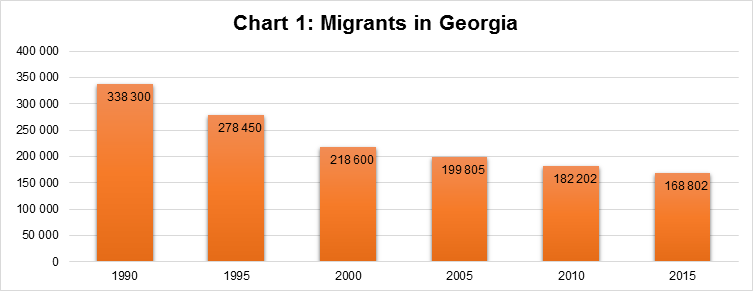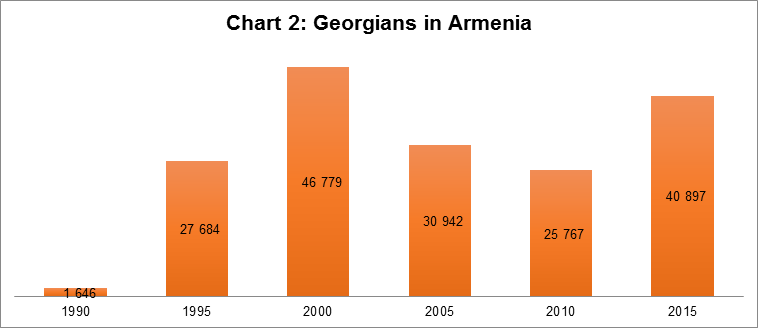 30
June
2022
30
June
2022
ISET Economist Blog
 Saturday,
28
January,
2017
Saturday,
28
January,
2017

 Saturday,
28
January,
2017
Saturday,
28
January,
2017
Whatever Kim Jong-un’s propaganda says about the greatness of his country, it is a fact that nobody immigrates to North Korea but almost everyone wants to get out. Likewise, whatever conservative Muslims say about the depraved West – there is a huge net migration out of Muslim countries into these rotten and decadent Western societies. And also the “socialist paradises” of the past had to take great efforts to make sure their lucky populations did not leave: the Berlin Wall was built in 1961 because the large-scale drainage of labor threatened Eastern Germany’s economic survival.
Like water flows follow the law of gravitation, migrant flows follow the law of economic incentives. This allegory is very much to the point, as one can even use the laws which govern water flows to model international migration. These so-called Gravity models have not too long ago become a big topic in migration research (see the 2016 survey article by Paul Ramos in the IZA World of Labor journal). Using this approach, one may predict where migration flows will occur, based on economic differentials and migration cost. This is done, for example, by the German company SAT, which has developed special software for this purpose (http://sat-ag.com/policysimulation/). Conversely, one may take migration flows as given and interpret them as indicators of economic opportunities and overall quality of life in different countries of the world. This is more informative than all political rhetoric about the greatness of a country etc., as migrants literally “vote with their feet”.
Chart 1 shows the number of foreign migrants living in Georgia between 1990 and 2015 (all data in this article come from the data set accompanying the 2015 UN report “Trends in International Migrant Stocks”). In this time span, the number of foreigners in Georgia has gone down by about 50% from about 340,000 to about 170,000. At first sight, this seems puzzling. Isn’t Georgia a top reforming country, blessed with enviably growth rates, and hasn’t it made great progress in terms of civil rights, democracy, and freedom of speech, all of which are factors that make life in Georgia more pleasant?

Well, first of all, the fact that the number of migrants decreased by about 120,000 between 1990 and 2000 is not surprising. Under Shevardnadze’s rule, Georgia had essentially become a failed state, permeated by extreme corruption and a bizarre prevalence of crime, afflicted with a kleptocratic government and struck with dire economic hardship.
What is more surprising, however, is that people kept leaving after 2005. Yet, water flowing down from a mountain also does not stop flowing when it has reached mid-level – as long as there is still gravity, it will flow the whole way into the valley. Likewise, the ever-decreasing numbers of migrants in Georgia have less to do with the situation in Georgia but more with the existence of alternative destinations with even better economic conditions. Why stay in Georgia if there are countries like Germany and Sweden that do not only offer higher income and better employment but even open their social welfare states to anybody residing within their borders? That these factors matter – very much in line with the gravity theory of migration – is, among others, proven by the fact that most migrants who arrive in Europe in Greece or Italy are not interested to apply for asylum or refugee status in those countries but eagerly move on to Germany and Sweden.
In this regard, Georgia is in a great situation. As Florian Biermann and Eric Livny wrote in their 2014 article (to be found on the ISET Economist Blog), commenting on the awkward immigration law that was temporarily put in place at that time: “Georgia can afford to have open borders and liberal labor markets. It reaps all the benefits from this policy without having to deal with the disadvantages”. Indeed, it is highly appreciated by international companies and investors if they can bring in experts and other personnel without having to bother with visa requirements and labor market barriers. This is a real competitive advantage which, as was frequently communicated to ISET by foreign entrepreneurs and firms operating in Georgia, has considerable weight in the decision whether to invest in Georgia. Thus, as long as Western Europe does not effectively control its immigration, Georgia has no reason to do so either.
Moreover, in a situation where Europe offers free social welfare, those migrants who search for a free lunch will not stay in Georgia, which offers no social welfare to foreigners whatsoever. Georgia can rely on a self-selection mechanism: those migrants who prefer to stay in Georgia instead of moving to Europe have good reasons to be here, for example, because they are qualified experts, or because they are doing business here.
A particularly interesting case to test the gravity hypothesis is migration from and to Armenia. The numbers of Georgians in Armenia, as shown in Chart 2, do indeed reflect the economic well-being of Georgia. Georgia was one of the richest republics in the Soviet Union, and so, in 1990, very few Georgians – even among those with Armenian backgrounds – had reasons to emigrate to Armenia. Less than 2,000 Georgians resided in their southern neighbor country. The subsequent failure of Shevardnadze is nicely illustrated by the migration development in the years that followed: by 1995, almost 28,000 Georgians had moved to Armenia, and in the year 2000, this number stood at 47,000.

When the reformers took over in Georgia, many of these people decided to return to their home country. By 2005, there were only 31,000 Georgians left in Armenia, and by 2010, this number had gone down to 26,000. Now we are back to 41,000, giving support to the perception of many people that in the last years, Georgia’s economic fortunes worsened.
Yet, the absolute numbers of migrants are somewhat puzzling. In 2015, there were 1,980 Armenian nationals residing in Georgia, while there were almost 41,000 Georgians in Armenia. How can that be? Doesn’t Georgia have the modern, western-oriented economy which is halfway in the European Union, and isn’t Armenia this landlocked country that entirely depends on Russia and does not trade with three of its four neighboring countries?
In contrast with this perception, the Armenian statistical office Armstat claims that wages are slightly higher in Armenia. In 2014 (the latest data available to us), the average wage was 788.5 lari in Georgia and 818 lari in Armenia (converted by the official rate of the Central Bank of Armenia). These numbers do not conflict with the fact that most sources state a slightly higher nominal per capita GDP for Georgia. A greater deal of the financial resources in Armenia derives from remittances and support of the strong Armenian diaspora, which is only reflected in the Armenian GDP in as far as it stimulates demand for local goods and services. In addition, not all income is wages (there is also capital income).
Maybe the situation in Armenia is not that bad in the end, despite the Russian influence. Indeed, unlike in Tbilisi, walking around in Central Yerevan evokes the impression that one is in a rather wealthy and very well-developed country. However, the suburbs of Yerevan do not look much different than the suburbs of Tbilisi, and the countryside of Armenia is in many places very dilapidated (even more than Georgia, where the situation in many villages is already quite depressing).
A more plausible explanation might be that many of the Georgians in Armenia are in fact ethnic Armenians who moved to Armenia in the 1990s for good, integrated into the Armenian society, and just did not return their Georgian citizenships. They would still be counted as Georgian migrants living in Armenia, while in fact, they are Armenians living in Armenia who are essentially culturally and economically indistinguishable from their compatriots.
Whatever the answer is, migration is a powerful indicator of a country’s well-being that should be taken into account by economists and policymakers alike. It can be used to evaluate economic achievements, and, if one is a politician, to advertise them. Yet, it goes even beyond economics and extends to the overall livability and well-being of a country, as this is what makes people leave or attract them. Migration speaks louder than words!





